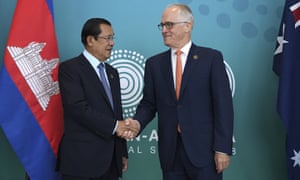 |
| Australian prime minister Malcolm Turnbull meets Cambodia’s Hun Sen, whose regime is being condemned for its increasing repression. Photograph: Dan Himbrechts/AAP |
Australia joins UN condemnation of Cambodia but refugee deal remains
Forty-five members of human rights council warn Hun Sen is presiding over an increasingly authoritarian regime
The Guardian | 22 March 2018
Australia has joined 44 other nations at the UN human rights council in condemning growing political violence and repression in Cambodia ahead of elections there this year.
Hun Sen, Cambodia’s strongman leader, was in Sydney last weekend for the Australia-Asean summit and met the prime minister, Malcolm Turnbull. It is understood the pair discussed human rights issues and the upcoming elections, as well as trade and the region’s nuclear threats.
But Australia maintains a controversial and expensive refugee deal where it sends refugees from its Nauru offshore processing centre to Cambodia, despite concerns over widespread human rights abuses in the south-east Asian country.
Hun’s presence in Sydney sparked significant demonstrations on the streets of the city, with protesters condemning him as a “thug” with “blood on his hands”.
In Geneva on Thursday morning Australian time, the 45 members of the 47-member human rights council said Cambodia had made significant democratic progress since the signing of the Paris peace agreement in 1991 ending the country’s civil war. But it had regressed in recent years, growing increasingly violent and authoritarian.
“As we near the elections scheduled for 29 July this year, our previous optimism has been replaced by deep concern about the recent serious decline of civil and political rights in Cambodia. These backward steps include signs of escalating repression of the political opposition, civil society and media,” the countries said.
“For the Cambodian government to retain its legitimacy, any elections must be free, fair and credible.”
Hun, a former Khmer Rouge cadre, has ruled Cambodia for more than 30 years. He has been credibly accused of large-scale corruption, enriching his family and cronies, as well as corruption of the criminal justice system, and sustained violence against and persecution of his political enemies.
The human rights council heard the Cambodian government used the country’s courts to jail political opponents and dissolve opposition parties. Dissidents have been murdered and opposition members of parliament publicly beaten or thrown out of parliament and replaced with members of Hun’s ruling People’s party and other parties.
The council heard all political prisoners in Cambodia should be released, including the leader of the opposition National Rescue party, Kem Sokha.
“We are particularly concerned about the conditions under which opposition leader Kem Sokha is being detained following his arbitrary arrest: he is reportedly in isolation, without adequate access to healthcare, subjected to intrusive observation and other conditions, such as constant light,” the council said.
The concerned countries told Cambodia it must reform “before it is too late, to ensure that the 2018 elections are free, fair and credible”.
“In particular, we urge that the elections take place in a peaceful environment without threats, arbitrary arrests or acts of intimidation, and that all international human rights obligations important for successful elections, such as rights to freedom of expression, press, association and peaceful assembly, are respected, protected and fulfilled.”
Australia maintains significant links to Hun’s administration. It has a refugee resettlement agreement under which refugees held by Australia on Nauru can settle in Cambodia.
The agreement has been an expensive failure for Australia and a windfall for Cambodia. It has cost Australia more than $40m in additional aid to Cambodia, as well as millions in administration and resettlement costs, but has resettled only three refugees.
At least four other refugees were moved to Cambodia but have since left. However, the Australian government refuses to confirm how many it has transferred to the country. The foreign minister, Julie Bishop, said the voluntary resettlement deal “remains on the table”.
Former foreign minister Gareth Evans, who helped broker a peace deal in war-ravaged Cambodia in the early 1990s as it recovered from the Khmer Rouge period and its war with Vietnam, this month said the “manifestly indefensible” refugee resettlement deal had compromised Australia’s response to Cambodia’s current political situation.
Daniel Webb, director of legal advocacy at the Human Rights Law Centre, said Australia’s decision to condemn the Hun regime was welcomed, but that the government’s own words revealed how unprincipled the Cambodian refugee deal was.
“It’s about time our government condemned the Hun Sen regime. It should also admit that paying that same regime $55m to offload refugees has been a morally bankrupt failure,” he said.


Australia joins UN condemnation of Cambodia but refugee deal remains
ReplyDelete----------------------
Words are cheap, money talks. And Australia still pays Cambodia to accept the unwanted refugees.
Dear opposition, you are all sore-losers. You have achieved nothing.